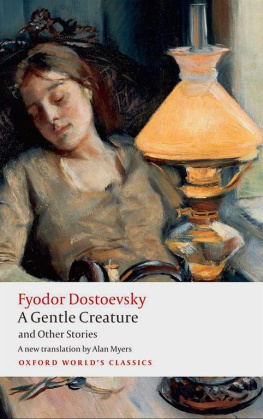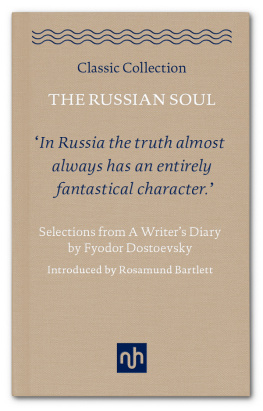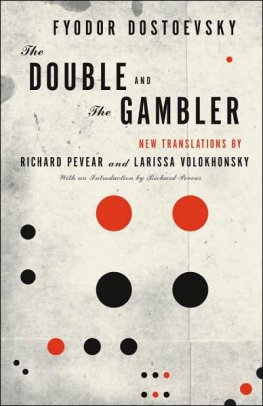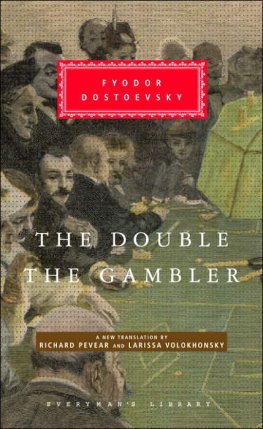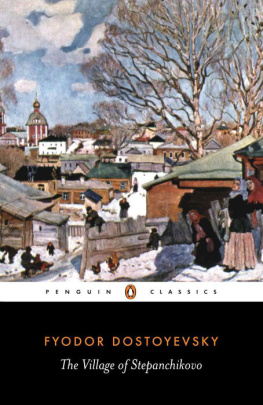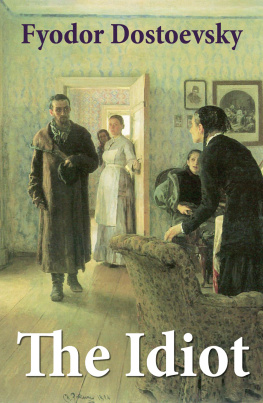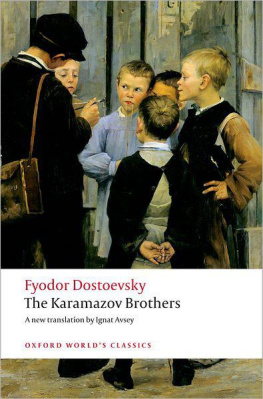
Great Clarendon Street, Oxford OX2 6DP
Oxford University Press is a department of the University of Oxford.
It furthers the Universitys objective of excellence in research, scholarship,
and education by publishing worldwide in
Oxford New York
Athens Auckland Bangkok Bogot Buenos Aires Calcutta
Cape Town Chennai Dar es Salaam Delhi Florence Hong Kong Istanbul
Karachi Kuala Lumpur Madrid Melbourne Mexico City Mumbai
Nairobi Paris So Paulo Singapore Taipei Tokyo Toronto Warsaw
with associated companies in Berlin Ibadan
Oxford is a registered trade mark of Oxford University Press
in the UK and in certain other countries
Published in the United States
by Oxford University Press Inc., New York
Translation, Note on the Translation, Explanatory Notes Alan Myers 1995
Introduction W. J. Leatherbarrow 1995
The moral rights of the author have been asserted
Database right Oxford University Press (maker)
First published as a Worlds Classics paperback 1995
Reissued as an Oxford Worlds Classics paperback 1999
Reissued 2009
All rights reserved. No part of this publication may be reproduced, stored in a retrieval system, or transmitted, in any form or by any means, without the prior permission in writing of Oxford University Press, or as expressly permitted by law, or under terms agreed with the appropriate reprographics rights organizations. Enquiries concerning reproduction outside the scope of the above should be sent to the Rights Department, Oxford University Press, at the address above
You must not circulate this book in any other binding or cover and you must impose this same condition on any acquirer
British Library Cataloguing in Publication Data
Data available
Library of Congress Cataloging in Publication Data
Data available
ISBN 9780199555086
Printed in Great Britain by
Clays Ltd, St Ives plc
OXFORD WORLDS CLASSICS
For over 100 years Oxford Worlds Classics have brought readers closer to the worlds great literature. Now with over 700 titlesfrom the 4,000-year-old myths of Mesopotamia to the twentieth centurys greatest novelsthe series makes available lesser-known as well as celebrated writing.
The pocket-sized hardbacks of the early years contained introductions by Virginia Woolf, T. S. Eliot, Graham Greene, and other literary figures which enriched the experience of reading. Today the series is recognized for its fine scholarship and reliability in texts that span world literature, drama and poetry, religion, philosophy and politics. Each edition includes perceptive commentary and essential background information to meet the changing needs of readers.
Refer to the to navigate through the material in this Oxford Worlds Classics ebook. Use the asterisks (*) throughout the text to access the hyperlinked Explanatory Notes.
OXFORD WORLDS CLASSICS

FYODOR DOSTOEVSKY
White Nights A Gentle Creature The Dream of a Ridiculous Man

Translated by
ALAN MYERS
With an Introduction and Notes by
W. J. LEATHERBARROW

OXFORD WORLDS CLASSICS
A GENTLE CREATURE
AND OTHER STORIES
FYODOR MIKHAILOVICH DOSTOEVSKY was born in Moscow in 1821, the second in a family of seven children. His mother died of consumption in 1837 and his father, a generally disliked army physician, was murdered on his estate two years later. In 1844 he left the College of Military Engineering in St Petersburg and devoted himself to writing. Poor Folk (1846) met with great success from the literary critics of the day. In 1849 he was imprisoned and sentenced to death on account of his involvement with a group of utopian socialists, the Petrashevsky circle. The sentence was commuted at the last moment to penal servitude and exile, but the experience radically altered his political and personal ideology and led directly to Memoirs from the House of the Dead (18612). In 1857, while still in exile, he married his first wife, Maria Dmitrievna Isaeva, returning to St Petersburg in 1859. In the early 1860s he founded two new literary journals, Vremia and Epokha, and proved himself to be a brilliant journalist. He travelled in Europe, which served to strengthen his anti-European sentiment. During this period abroad he had an affair with Polina Suslova, the model for many of his literary heroines, including Polina in The Gambler. Central to their relationship was their mutual passion for gamblingan obsession which brought financial chaos to his affairs. Both his wife and his much-loved brother, Mikhail, died in 1864, the same year in which Notes from the Underground was published; Crime and Punishment and The Gambler followed in 1866 and in 1867 he married his stenographer, Anna Snitkina, who managed to bring an element of stability into his frenetic life. His other major novels, The Idiot (1868), Devils (1871), and The Brothers Karamazov (1880) met with varying degrees of success. In 1880 he was hailed as a saint, prophet, and genius by the audience to whom he delivered an address at the unveiling of the Pushkin memorial. He died seven months later in 1881; at the funeral thirty thousand people accompanied his coffin and his death was mourned throughout Russia.
ALAN MYERS has translated a wide variety of contemporary Russian prose and poetry, including poems, essays, and plays by Joseph Brodsky. He has also produced a volume of facsimile versions from the golden age of Russian poetry, An Age Ago. His translations of Dostoevskys The Idiot and Pushkins The Queen of Spades and Other Stories are also in Oxford Worlds Classics.
WILLIAM LEATHERBARROW is Professor of Russian at the University of Sheffield. His publications include Fedor Dostoevsky: A Reference Guide (Boston, Mass., 1990), Dostoyevsky: The Brothers Karamazov (Cambridge, 1992) and Dostoevskii and Britain (Oxford, 1995).
CONTENTS
NOTE: Readers who would prefer not to know the details of the stories beforehand are advised to read this Introduction after the book itself.
The publication of Fyodor Mikhailovich Dostoevskys first novel, Poor Folk, in January 1846 was a most striking literary dbut. This apparently slight and sentimental exchange of letters between a poor, middle-aged government clerk and the young seamstress he loves saw its author elevated practically overnight from obscurity to literary celebrity. The periodical press received the work with widespread acclaim (although the more conservative newspapers and journals were lukewarm). The poet Nekrasov, in whose almanac Poor Folk first appeared, insisted that a new Gogol has appeared, referring to the strange prose-poet Nikolai Gogol (180952), whose grotesque masterpieces are among the finest achievements of nineteenth-century Russian prose; and the leading literary critic of the time and the rallying point for progressive opinion in Russia, Vissarion Belinsky (181148), recognizing at once Dostoevskys promise, summoned him to his presence and told him to his face that he would be a great writer.
Next page
